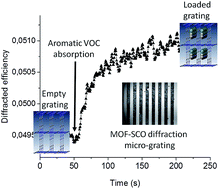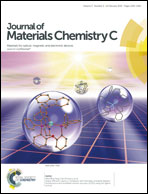Spin-crossover metal–organic frameworks: promising materials for designing gas sensors†
Abstract
We present a quantitative study of the sensing behavior of micro-patterned gratings based on the metal–organic framework type spin crossover complex Fe(bpac)[Pt(CN)4] (1) in the presence of vapors of various organic compounds. The gratings of 1 were fabricated by combining a sequential assembly technique and a photolithographic method. The guest absorption driven change of the spin state and the associated variation of the refractive index were in situ monitored by optical diffraction on a grating of 1. Our sensor is characterized by good reversibility, room temperature operation, a low limit of detection (∼30 ppm for molecules of iodobenzene) as well as a linear dynamic range of detection (from 300 to 1500 ppm). The possibility of selectively desorbing the analytes by thermal annealing confers also selectivity to the sensor.


 Please wait while we load your content...
Please wait while we load your content...